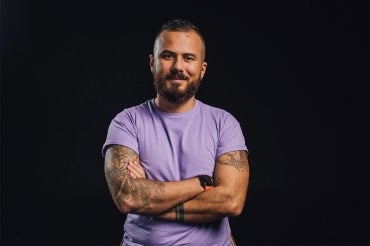Danny Ramadan is U of T Scarborough’s new writer-in-residence

Published: February 6, 2023
As a gay person growing up in Syria, Danny Ramadan says every day was like taking a paper cut to his mental health.
“I was navigating a lot of trauma. I was a queer child in a very dysfunctional family system and a hyper-masculine, working-class environment,” he says. “I felt like my mentality kept crashing and I kept putting it back together by writing about it. Writing was how I didn't die by a thousand paper cuts.”
 What began as a coping mechanism led to several books, articles and short stories that have garnered awards and critical acclaim. His debut novel, The Clothesline Swing, was named among the best books of the year by the Globe and Mail and Toronto Star, while his children’s book, Salma the Syrian Chef, won the Nautilus Book Award and The Middle East Book Award.
What began as a coping mechanism led to several books, articles and short stories that have garnered awards and critical acclaim. His debut novel, The Clothesline Swing, was named among the best books of the year by the Globe and Mail and Toronto Star, while his children’s book, Salma the Syrian Chef, won the Nautilus Book Award and The Middle East Book Award.
He’s now bringing his years of writing experience to U of T Scarborough as writer-in-residence, a role that connects celebrated writers with the school community through office hours, workshops and appearances in classrooms and events.
Ramadan has been a published writer since age 10, when his first poem appeared in a children’s magazine in Damascus. No one else in his life shared his passion, but he kept writing, finding himself particularly drawn to short stories. Ramadan says he didn’t inherit his writing prowess, but adds that his family did hand down their voices. He internalized the voice of his father, which espouses toxic masculinity, and one from his mother, which tells him to doubt himself.
“Sometimes you have the voices of several doubters living in your head. I think that's a fluffy term for childhood trauma, the voices we take on that are foreign to ourselves,” he says.
 Ramadan’s life changed at age 17 when he first said out loud to his family that he was gay. Ramadan experienced homelessness and slept on friends’ couches until he found his own place – all while still using writing as a lifeline. He examined everything around him, including the concept of coming out. Unlike in Toronto, a city where LBGTQ+ organizations, institutions and communities are common, he says coming out in Damascus often means losing every form of support.
Ramadan’s life changed at age 17 when he first said out loud to his family that he was gay. Ramadan experienced homelessness and slept on friends’ couches until he found his own place – all while still using writing as a lifeline. He examined everything around him, including the concept of coming out. Unlike in Toronto, a city where LBGTQ+ organizations, institutions and communities are common, he says coming out in Damascus often means losing every form of support.
“Queerness is not a club where you need to come out to receive your membership card,” he says. “You need to navigate the world according to the dynamics around you.”
At age 20, Ramadan published his first collection of short stories in Egypt, drawing job offers that led him to move to the country for seven years. In 2010, he returned to Syria as national unrest culminated in the Syrian civil war. He began running an underground centre for LGBTQ+ Syrians out of his home, an endeavor he calls “beautifully naive,” and one that landed him in prison for six weeks.
Upon his release, he was declared persona non grata by the Syrian government and moved to Lebanon as a refugee. Writing fiction has always been his life’s calling, but it didn’t initially offer a steady source of income. He became a journalist to pay the bills and by his late-20s was reporting for the Washington Post from the heart of the refugee crisis in the Middle East.
The three years he spent as a reporter are not a time Ramadan looks back on fondly. He spent hours counting bodies in YouTube videos, interviewing rebels and dissecting massacres for articles that sometimes didn’t get published, depending on what the ever-churning news cycle deemed most important that day.
“I never felt like I had my own voice. I was just part of a much larger machine as a journalist,” he says. “In my creative writing, I feel like I'm my own boss. I am the master of my own craft and I have a village of folks who are supporting me.”
In 2014, he arrived in Vancouver as a refugee, where he lives with his husband and dog. He earned a master’s degree in fine arts in creative writing from the University of British Columbia.
Ramadan has 18 doves tattooed on his bicep – one for each LGBTQ+ Syrian refugee his annual fundraiser, “An Evening in Damascus,” has brought to Canada – and he still has to add three more birds. His charity has raised more than $300,000 to support LGBTQ+ Syrian refugees.
Ramadan’s memoir is scheduled for release in the summer of 2024 and he is working on a series of short stories and children’s books. On campus, he recently hosted a reading and holds office hours on Thursdays.
“I am a big fan of talking to folks,” he says. “I'm very approachable. So let's talk.”



